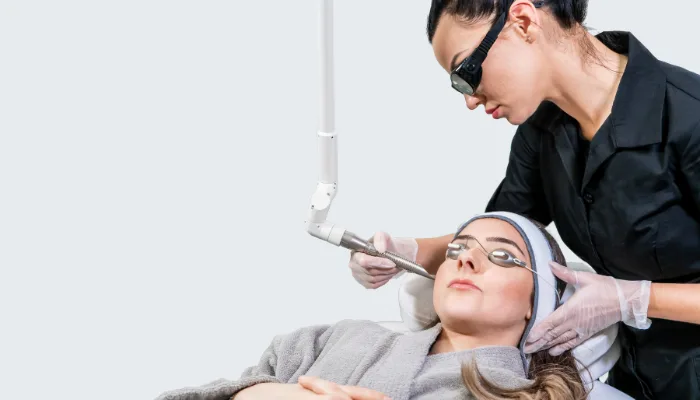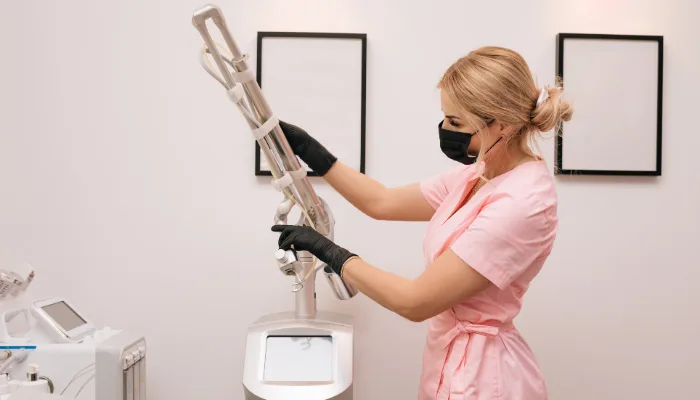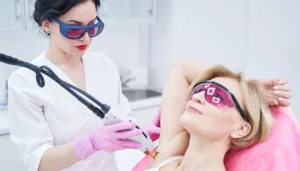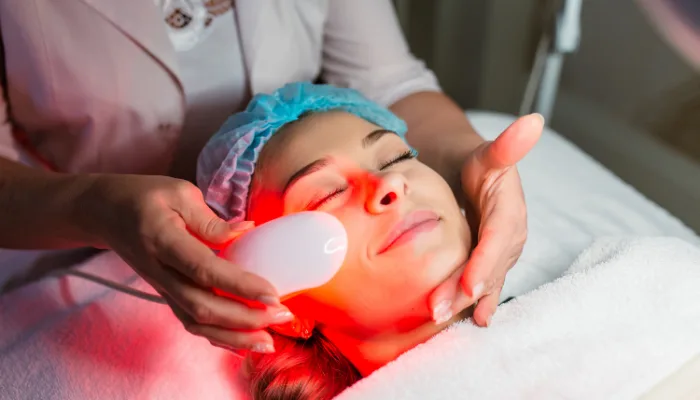
If you’re looking to take your career in aesthetics to the next level, laser training short courses could be just what you need. These courses offer a focused way to acquire essential skills and knowledge about laser technology, making you more competitive in the job market. Understanding the ins and outs of laser applications can open up a world of opportunities.
Key Takeaways
- Laser training short courses provide essential skills for various aesthetic treatments.
- Certification in laser techniques can significantly enhance your job prospects.
- Choosing the right course involves checking accreditation and understanding course content.
- Real-world applications of lasers span across aesthetics and healthcare, catering to diverse client needs.
- Continuous education in laser technology is vital to stay relevant in a fast-evolving industry.
Understanding Laser Training Short Courses
Overview of Laser Training
Laser training short courses are designed to give you the skills and knowledge you need to safely and effectively use lasers in various applications. These courses cover everything from the basics of laser physics to the practical aspects of operating laser equipment.
You’ll learn about different types of lasers, their uses, and the safety protocols you need to follow. It’s a mix of theory and hands-on practise, so you’re not just reading about it, you’re actually doing it.
Types of Laser Training Courses
There’s a surprising variety of laser training courses out there, each tailored to specific needs and career paths. You’ve got your general laser safety courses, which are a must for anyone working with lasers. Then there are courses focused on specific applications, like laser hair removal, laser tattoo removal, or laser skin resurfacing.
Some courses are designed for medical professionals, covering the use of lasers in surgery and other medical procedures. And if you’re looking to specialise, you can find courses on things like laser cutting, laser welding, and even laser engraving. The length and intensity of these courses can vary quite a bit, so it’s worth doing your research to find one that fits your goals and experience level.
Importance of Certification
Getting certified in laser operation is more than just a piece of paper; it’s a signal to employers and clients that you know your stuff. Certification shows that you’ve met certain standards of competence and that you’re committed to safety and best practises.
Plus, in some areas, certification is actually required by law to operate certain types of laser equipment.
Think of it this way: would you trust someone to perform laser hair removal on you if they hadn’t been properly trained and certified? Probably not. Certification gives you credibility and helps you stand out in a competitive field. It also gives your clients peace of mind, knowing they’re in safe hands.
Benefits of Enrolling in Laser Training Short Courses
Enhanced Skill Development
Laser training short courses are a great way to get up to speed with the latest techniques. You’ll gain hands-on experience and a solid understanding of the science behind laser treatments.
This means you can offer safe and effective treatments, adapting to what clients want. It’s all about boosting your skills and confidence.
Increased Career Opportunities
Laser training can open doors to lots of specialist jobs. More and more clinics and spas are using laser treatments, so having these skills makes you a more attractive candidate.
Laser expertise can lead to better pay and more interesting roles. Employers are always looking for people who can do things like laser hair removal, skin resurfacing, and tattoo removal. Adding these skills to your CV can really make a difference.
Improved Client Satisfaction
Happy clients are key to a successful business. Laser training helps you give better results, which makes clients happier. You’ll learn how to tailor treatments to each person’s needs, dealing with their concerns effectively.
By understanding the different laser applications, you can treat everything from hair removal to skin rejuvenation. This means you can offer custom solutions, boosting your marketability and expertise.
Choosing the Right Laser Training Short Course
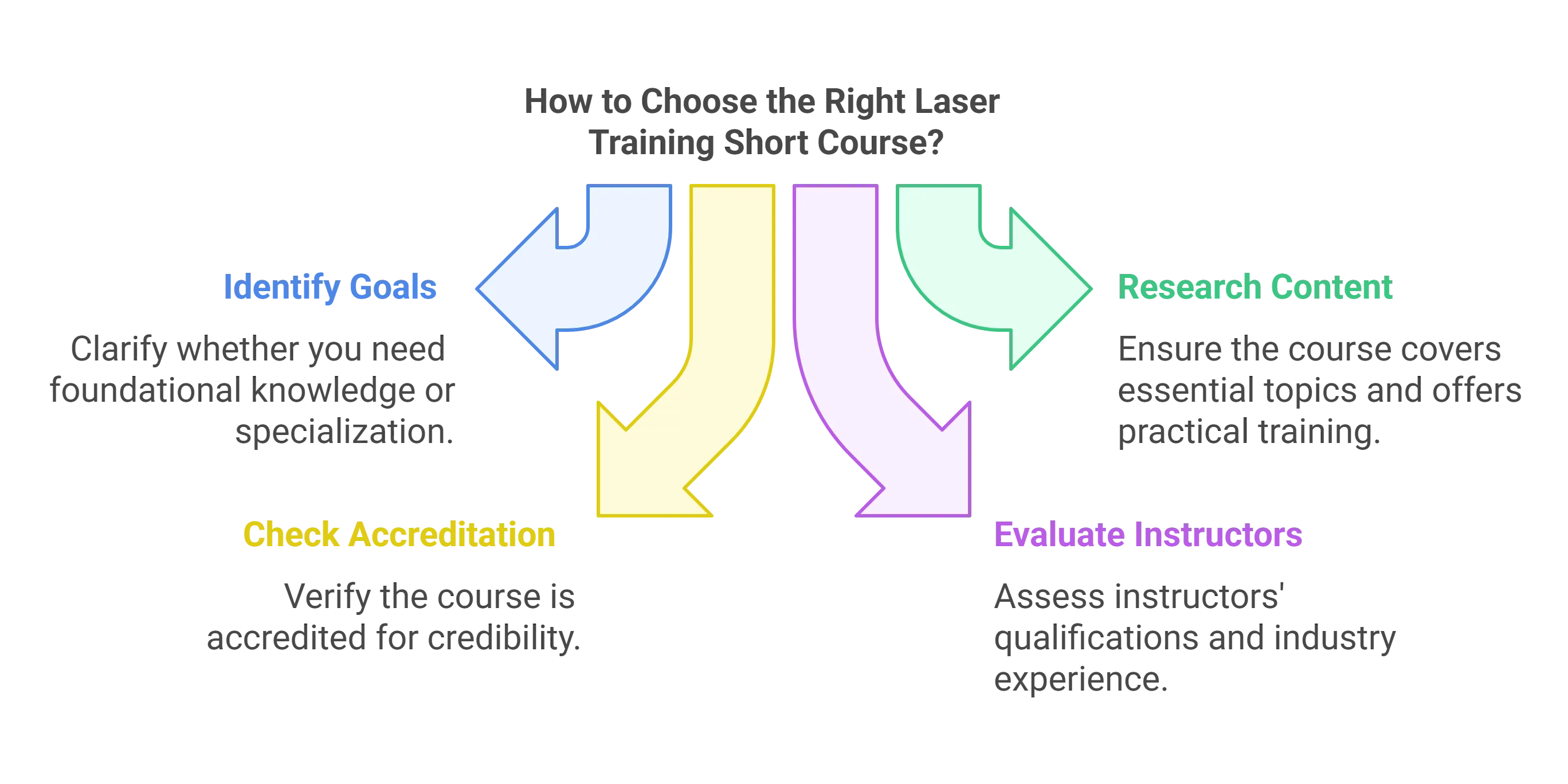
So, you’re thinking about taking a laser training course? Great! But with so many options out there, how do you pick the right one? It can feel a bit overwhelming, but don’t worry, we’ll break it down.
Factors to Consider
Okay, first things first, what do you actually want to get out of this course? Think about your career goals and what skills you need to achieve them. It’s like choosing the right tool for a job – you wouldn’t use a hammer to screw in a bolt, would you?
Here are some things to think about:
- Course Content: Does the course cover the specific laser technologies and treatments you’re interested in? Are you looking at laser hair removal, skin resurfacing, or something else entirely?
- Your Current Skill Level: Are you a complete beginner, or do you have some existing experience? Make sure the course is at the right level for you.
- Learning Style: Do you prefer hands-on learning, or are you happy with mostly theory? Some courses are very practical, while others are more classroom-based.
- Timetable: Can you fit the course around your current commitments? Some courses are full-time, while others are part-time or online.
- Cost: Laser training courses can vary a lot in price. Set a budget and stick to it. Don’t forget to factor in travel and accommodation costs if needed.
Accreditation and Certification
This is a big one. You want to make sure the course you choose is properly accredited. Accreditation basically means that the course has been independently assessed and meets certain quality standards. A recognised certification is a must-have.
Without proper accreditation, you might end up with a qualification that isn’t recognised by employers or insurance companies. It’s like getting a degree from a university that doesn’t actually exist – pretty useless.
Course Duration and Format
Course duration and format are important things to consider. Some courses are short and intensive, while others are longer and more spread out. Think about what works best for your learning style and your schedule.
A short, intensive course might be great if you want to get qualified quickly, but it could also be overwhelming if you’re new to the subject. A longer course might be more manageable, but it will obviously take up more of your time.
Consider these formats:
- Full-time: Intensive, hands-on, and gets you qualified quickly.
- Part-time: More flexible, allowing you to study alongside other commitments.
- Online: Convenient and accessible, but requires self-discipline and may lack practical experience.
Real-World Applications of Laser Techniques
If you’re thinking about laser training, it’s worth knowing where these skills can actually take you. It’s more than just theory; it’s about practical application and seeing real results.
Case Studies in Aesthetics
Let’s get real: aesthetics is where a lot of people first think of lasers. And for good reason! The precision and effectiveness of laser treatments are pretty impressive. Think about it – things like:
- Laser hair removal: Loads of clients report a permanent reduction in hair after a handful of sessions.
- Tattoo removal: Multiple sessions can significantly fade unwanted tattoos.
- Fractional laser resurfacing: Patients often see a real improvement in skin texture within a few months.
- Acne scar treatment: Many individuals notice a visible reduction in scarring after treatment.
Laser Applications in Healthcare
It’s not just about looking good, though. Lasers are making waves in healthcare too. From eye surgery to physiotherapy, the applications are broad and constantly expanding. Lasers are used for:
- Precise surgical procedures, reducing recovery times.
- Treating vascular lesions and other skin conditions.
- Pain management and tissue repair in physiotherapy.
Emerging Trends in Laser Technology
Things are moving fast in the world of lasers. We’re seeing new types of lasers and innovative ways to use existing ones all the time. It’s worth keeping an eye on these trends, as they could open up new opportunities for you.
Staying up-to-date with the latest advancements in laser technology is important for anyone looking to make a career in this field. The industry is constantly evolving, and new applications are always being discovered. Continuous learning is key to staying competitive and providing the best possible service to clients or patients.
Here’s a quick look at some of the things happening:
- Developments in non-ablative lasers for skin rejuvenation.
- Increased use of lasers in dental procedures.
- Research into laser-based diagnostics and imaging techniques.
Career Advancement Through Laser Training
Laser training short courses aren’t just about learning a new skill; they’re a launchpad for your career. Whether you’re looking to move up the ladder, switch roles, or simply earn more, these courses can provide the boost you need.
Transitioning to New Roles
Many aesthetic clinics and healthcare facilities are actively seeking professionals with laser skills. It’s a growing field, and having the right qualifications can make you a really attractive candidate.
You could move into roles specialising in laser hair removal, skin rejuvenation, or even laser tattoo removal. It’s all about opening doors to new and exciting opportunities.
Expanding Your Professional Network
These courses aren’t just about the technical stuff; they’re also a great way to meet people. You’ll be learning alongside other professionals, and networking is a huge part of career development.
You’ll connect with instructors who are experts in the field, and fellow students who might become future colleagues or even business partners. It’s about building relationships that can help you throughout your career.
Potential Salary Increases
Let’s be honest, money matters. Acquiring laser skills can lead to a significant increase in your earning potential. Here’s a quick look at how laser training might impact your salary:
| Skill Acquired | Average Salary Increase (Estimated) |
|---|---|
| Laser Hair Removal | £3,000 – £7,000 |
| Skin Rejuvenation | £4,000 – £8,000 |
| Laser Tattoo Removal | £5,000 – £9,000 |
Investing in laser training is an investment in yourself. It’s about gaining skills that are in demand, building a network of contacts, and ultimately, earning more money. It might seem like a big step, but the rewards can be well worth the effort.
Here are some things to consider:
- The specific laser treatments you want to offer.
- The demand for those treatments in your area.
- Your current skill level and experience.
Safety and Best Practises in Laser Training
Understanding Laser Safety Protocols
Okay, so laser training isn’t just about zapping away unwanted hair or smoothing wrinkles; it’s also about knowing how to do it safely. Understanding laser safety protocols is absolutely paramount.
We’re talking about things like understanding different laser classifications, the potential hazards associated with each, and how to control those hazards. This includes knowing your stuff about:
- Eye protection: Different lasers need different goggles. Get it wrong, and you’re in trouble.
- Skin protection: Lasers can burn, so knowing how to protect skin is key.
- Room safety: Is the room properly set up to contain laser radiation?
- Equipment maintenance: A faulty laser is a dangerous laser.
It’s easy to get complacent, especially when you’ve been doing this for a while. But lasers are powerful tools, and a moment’s inattention can lead to serious injury. Always double-check your settings, your safety gear, and your environment before you start.
Risk Management in Laser Procedures
Risk management is all about identifying what could go wrong and putting steps in place to stop it from happening. It’s not just about following rules; it’s about thinking ahead. Here’s a few things to consider:
- Patient assessment: Is the patient suitable for laser treatment? Are there any contraindications?
- Treatment parameters: Are you using the right settings for the patient’s skin type and the treatment you’re performing?
- Emergency procedures: What do you do if something goes wrong? Do you have the right equipment and training to deal with complications?
Regulatory Compliance
Here’s the thing: laser treatments are regulated, and for good reason. Regulatory compliance isn’t just about ticking boxes; it’s about ensuring that you’re operating within the law and that you’re providing a safe service to your clients. This means:
- Staying up-to-date with the latest regulations and guidelines.
- Ensuring that your equipment is properly certified and maintained.
- Keeping accurate records of all treatments.
- Having the correct insurance in place.
Basically, don’t cut corners. It’s not worth the risk to your clients, your business, or your career.
Future of Laser Training in the Aesthetic Industry
Technological Advancements
Laser tech is always changing, and it’s getting pretty interesting. We’re seeing more multi-wavelength lasers and systems that use AI. What does this mean? Well, treatments can be more specific to what each client needs.
Plus, things like safety and how well the treatment works are getting better, and people don’t need as much time to recover. Keeping up with these changes is a must if you want to stay ahead in the aesthetics game.
Evolving Client Expectations
Clients want treatments that are quick, not too invasive, and give them a natural look. To meet these needs, you might want to think about specialising in the newest trends.
This way, you can give clients top-notch treatments that fit what they’re after. It’s all about giving them what they want, right?
The Role of Continuous Education
To really do well in aesthetics, you’ve got to keep learning. Laser training doesn’t stop after just one course. You need to keep up with the newest tech, best ways to do things, and what clients are looking for.
This means doing more courses, going to workshops, and being part of the aesthetics community. If you keep learning, you’ll not only be great at what you do but also show everyone that you’re serious about giving the best care possible.
Staying informed about industry changes, sharing insights, and building connections will enrich your professional journey. Networking is so important in the aesthetics field, as it helps you grow relationships that can lead to future career opportunities, mentorship, and collaboration.
Here’s a quick look at how continuous education can boost your career:
- Mastering new laser techniques.
- Adapting to changing client needs.
- Staying competitive in the industry.
Conclusion
Taking a laser training short course can be a game changer for your career. It opens up new doors and gives you the skills needed to stand out in a competitive job market. Whether you’re looking to specialise or just want to add to your existing qualifications, these courses can help you achieve your goals.
Plus, with the demand for laser treatments on the rise, having this training under your belt makes you a more appealing candidate to employers. So, if you’re ready to take the next step in your career, enroll in a laser training course today. It could be the boost you need to reach new heights.
Frequently Asked Questions
What are laser training short courses?
Laser training short courses are classes designed to teach people how to use lasers safely and effectively in various fields like beauty and healthcare.
Who can benefit from laser training?
Anyone interested in working with lasers, such as beauty therapists, healthcare workers, or those looking to switch careers, can benefit from laser training.
How long do these courses usually take?
Most laser training short courses can be completed in a few days to several weeks, depending on the level of detail and hands-on practise included.
Is certification important after completing a laser training course?
Yes, getting certified after completing a course is important as it shows you have the necessary skills and knowledge to work safely with lasers.
What job opportunities can I find after completing laser training?
After completing laser training, you can find jobs in beauty clinics, hospitals, and medical offices, often in roles that involve laser treatments.
Are there any safety risks associated with laser use?
Yes, there are safety risks with laser use, which is why proper training and following safety guidelines are crucial to prevent accidents.

